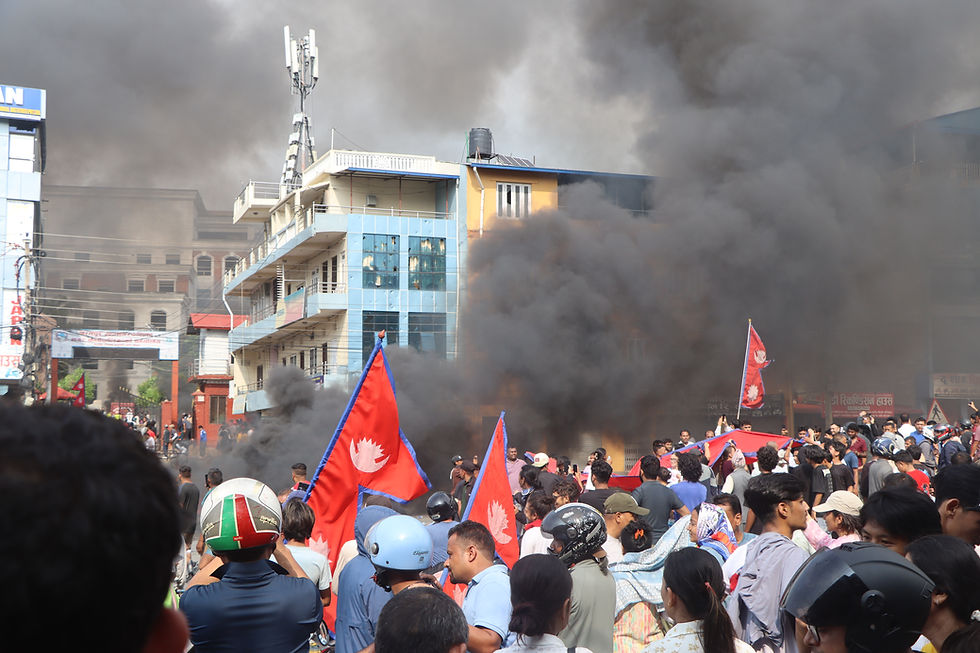Gen Z Revolutionaries 'Locked In' To Take A Government Down, How Did Nepalese Youth Get To Electing A Prime Minister On Discord?
- Arsima Bereketab

- Oct 29, 2025
- 3 min read

Nepal has one of the highest social media usages per capita in South Asia, so when the government announced its plans to ban 26 social media platforms including X and Facebook, the nation erupted. Primarily youth protesters flooded the streets to vent their anger. After two days of political unrest and smoke-filled cities, a new interim Prime Minister was elected to serve at the hands of the people. Many are hopeful for change, but the unrest will merely be redoubled if protesters’ demands are not met.
Prime Minister Sharma Oli, leader of the Communist party of Nepal, was forced to resign after being targeted by the mass protests and political turmoil that rocked the nation. Oli served his fourth term this year before being vigorously defenestrated, and was once regarded as a ‘strong crusader for democracy’ as he fought, and was jailed, for his communist and democratic values. This year, the facade came crashing down.
Political frustration has afflicted Nepal for years, as the youth are struggling with unemployment, with an estimated 14% of the population working overseas as a result. Inflation, economic hardship, and most of all, political corruption has left many disillusioned and disgruntled. The lavish lifestyles of politicians and their children, who flaunt their luxury items, cars and hotels while Nepal remains the second poorest country in South Asia, rubbed endless salt in the wound. Social media became the outlet for the youth to express their frustration as they mocked their decadence with terms like ‘nepo babies’ going viral across all platforms. The government, all too late, moved to ban 26 social media platforms, claiming that they did not comply with a deadline to register with the ministry of communication and information technology. This enraged Nepales netizens, yet the government defended their initiative, stating that it would tackle fake news, hate speech and online fraud. Unsurprisingly, this did not sit well with the Nepalese youth, and they took to the streets to make their stance clear.
Mass unrest swept across the country, as thousands of young people proclaimed their exasperation. This quickly escalated into violent and deadly protests, resulting in the deaths of 72 people. Official buildings, homes of politicians and even luxury hotels were vandalised, looted and set alight, the most notable among them being the Nepalese Parliament, which was also set alight. Order was finally restored late the next day once the army was deployed. General Ashok Raj Sigdel accused the protesters of capitalising on the chaos, by destroying public and private property, though inviting protesters to collaborate and find a resolution to the unrest. Estimates suggest that the financial damages of these protests could amount to 3 trillion Nepalese rupees, almost half Nepal’s GDP - a stark indication of the nation’s built up frustration. Prime Minister KP Sharma Oli, who held office for roughly 6 fragmented years prior, could never hope to survive such egregious failures in law and order. Upon his resignation, he stated that he was stepping down to ‘facilitate the solution to the problem’ and Gen Z took to the streets again to celebrate their victory.
Almost two months later, Nepal’s future remains uncertain. Nepal’s first female Prime Minister was sworn into office, with a rather Gen Z twist to the procedure, insofar as Sushila Karki was elected through a poll on discord. The poll was organised by Hami Nepal, the leaderless group behind the protests. With over 160,000 members a part of the group chat and around 10,000 for the vote, Karki was chosen. She was selected on behalf of her reputation while she was a chief justice to rejecting corruption, famously rejecting multiple ministers asking for favours during her tenure. Her first speech as PM emphasised her commitment to change, stating that she did not become Prime Minister because she sought it, but rather because ‘there were voices from the streets demanding that Karki should be given the responsibility.’ She also spotlighted her commitment to good governance and economic equality, commitments that resonated with the nation.
Reconstruction will not be easy, only one month after her accession, concerns are building over her lethargic progress. Yet optimism continues to run high. After all, the same generation lampooned for being glued to their screens successfully took down a government. The future is bright for Nepal, but Karki has a lot of work to do, so in true Gen Z fashion, it’s time to lock in.
Image: Wikimedia Commons/हिमाल सुवेदी
No image changes made.
.png)



Comments